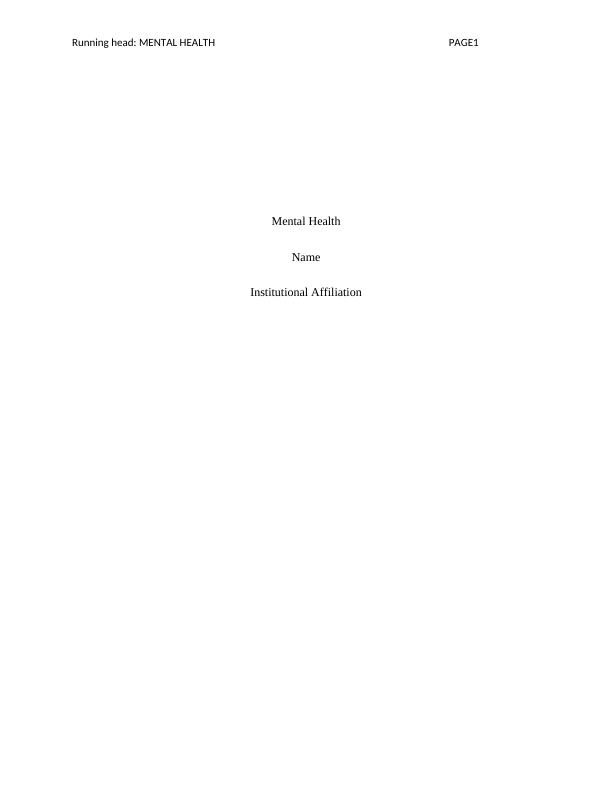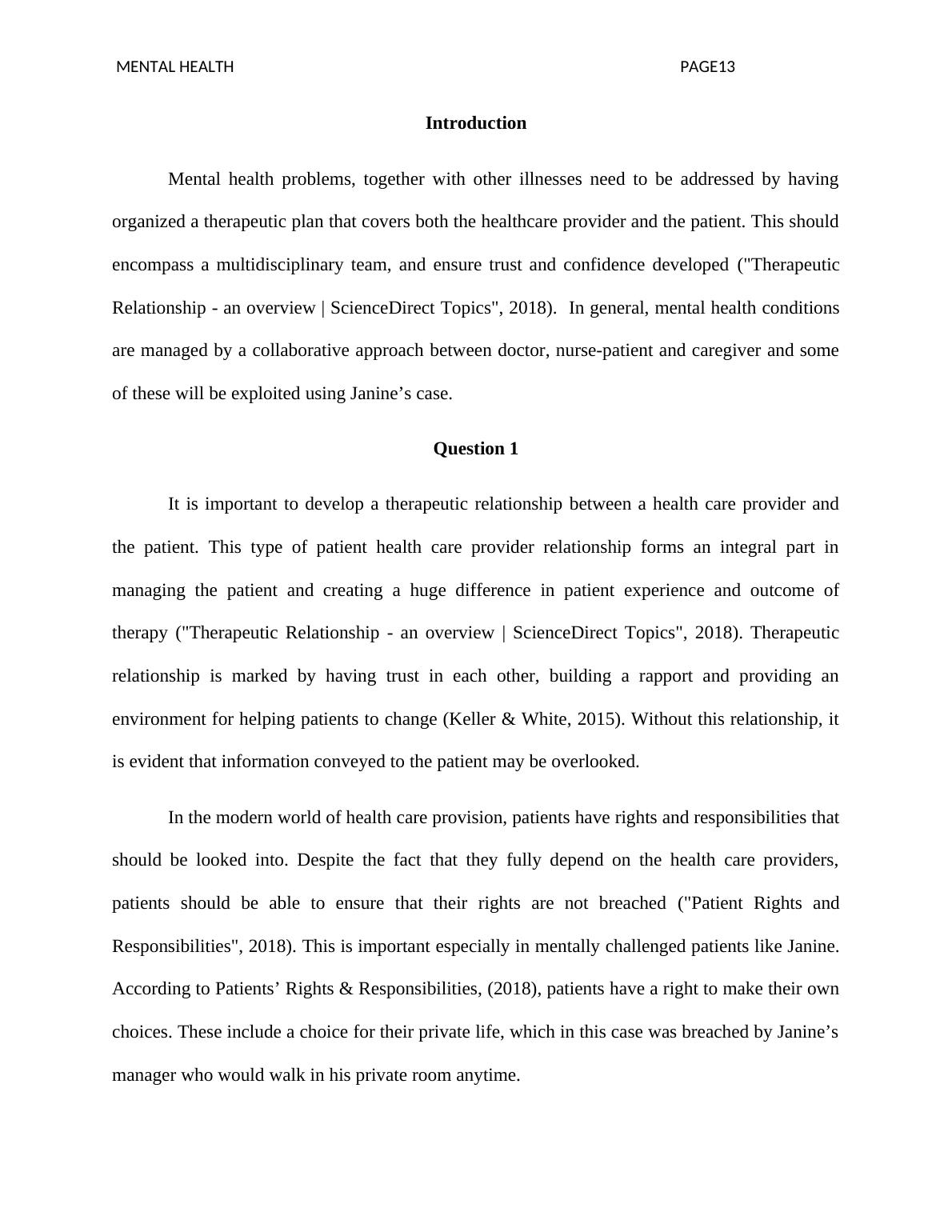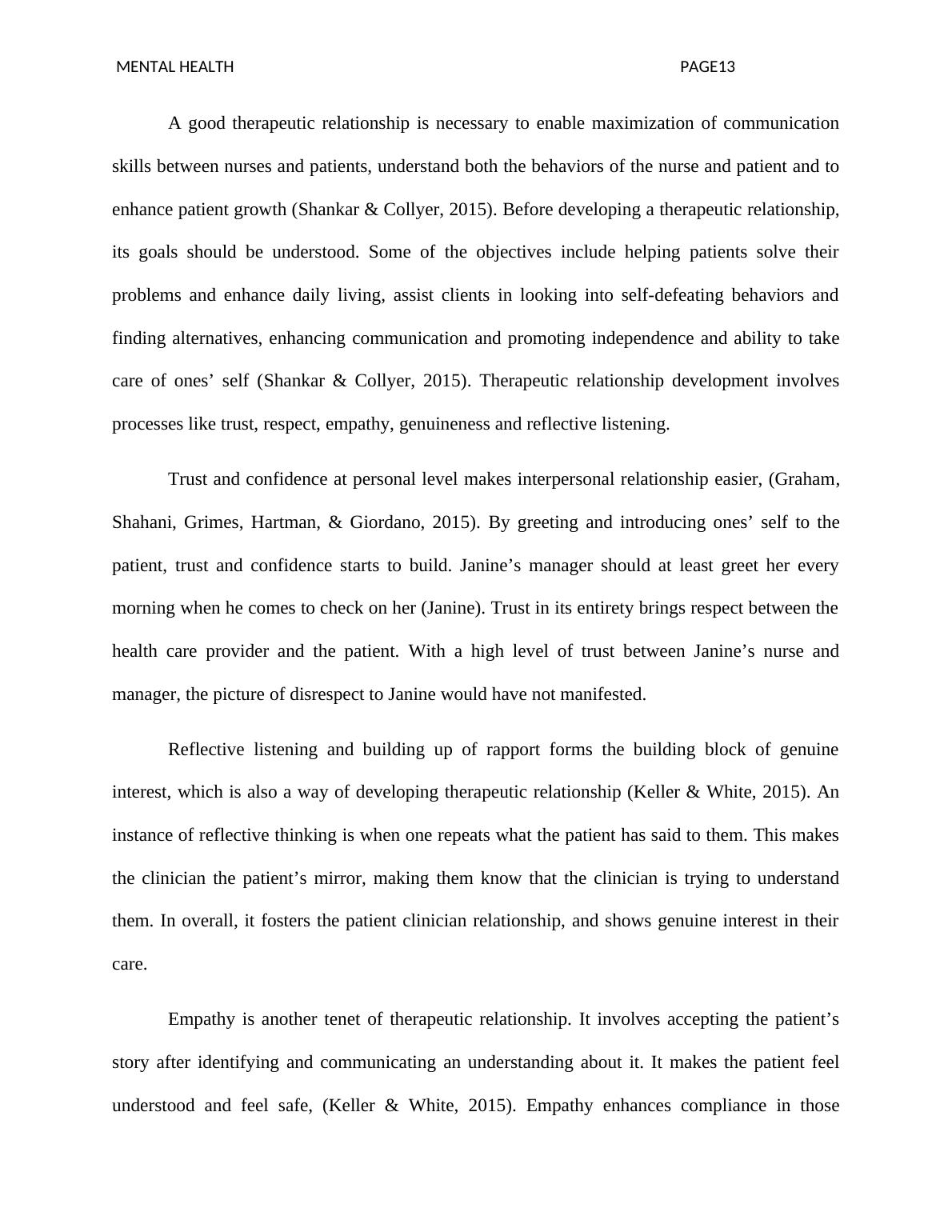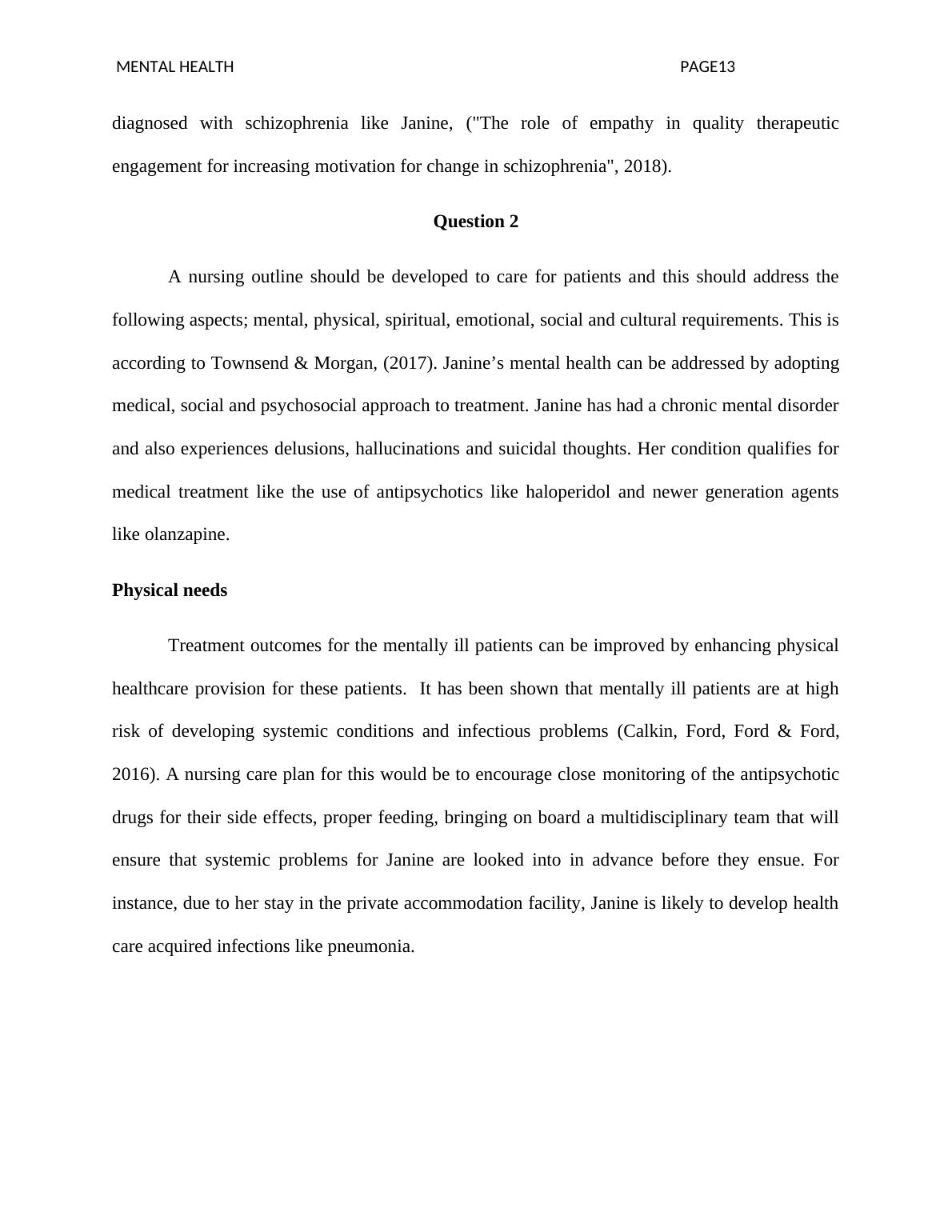Managing Mental Health: A Collaborative Approach
Added on 2023-06-07
13 Pages3426 Words184 Views
Running head: MENTAL HEALTH PAGE1
Mental Health
Name
Institutional Affiliation
Mental Health
Name
Institutional Affiliation

MENTAL HEALTH PAGE13
Introduction
Mental health problems, together with other illnesses need to be addressed by having
organized a therapeutic plan that covers both the healthcare provider and the patient. This should
encompass a multidisciplinary team, and ensure trust and confidence developed ("Therapeutic
Relationship - an overview | ScienceDirect Topics", 2018). In general, mental health conditions
are managed by a collaborative approach between doctor, nurse-patient and caregiver and some
of these will be exploited using Janine’s case.
Question 1
It is important to develop a therapeutic relationship between a health care provider and
the patient. This type of patient health care provider relationship forms an integral part in
managing the patient and creating a huge difference in patient experience and outcome of
therapy ("Therapeutic Relationship - an overview | ScienceDirect Topics", 2018). Therapeutic
relationship is marked by having trust in each other, building a rapport and providing an
environment for helping patients to change (Keller & White, 2015). Without this relationship, it
is evident that information conveyed to the patient may be overlooked.
In the modern world of health care provision, patients have rights and responsibilities that
should be looked into. Despite the fact that they fully depend on the health care providers,
patients should be able to ensure that their rights are not breached ("Patient Rights and
Responsibilities", 2018). This is important especially in mentally challenged patients like Janine.
According to Patients’ Rights & Responsibilities, (2018), patients have a right to make their own
choices. These include a choice for their private life, which in this case was breached by Janine’s
manager who would walk in his private room anytime.
Introduction
Mental health problems, together with other illnesses need to be addressed by having
organized a therapeutic plan that covers both the healthcare provider and the patient. This should
encompass a multidisciplinary team, and ensure trust and confidence developed ("Therapeutic
Relationship - an overview | ScienceDirect Topics", 2018). In general, mental health conditions
are managed by a collaborative approach between doctor, nurse-patient and caregiver and some
of these will be exploited using Janine’s case.
Question 1
It is important to develop a therapeutic relationship between a health care provider and
the patient. This type of patient health care provider relationship forms an integral part in
managing the patient and creating a huge difference in patient experience and outcome of
therapy ("Therapeutic Relationship - an overview | ScienceDirect Topics", 2018). Therapeutic
relationship is marked by having trust in each other, building a rapport and providing an
environment for helping patients to change (Keller & White, 2015). Without this relationship, it
is evident that information conveyed to the patient may be overlooked.
In the modern world of health care provision, patients have rights and responsibilities that
should be looked into. Despite the fact that they fully depend on the health care providers,
patients should be able to ensure that their rights are not breached ("Patient Rights and
Responsibilities", 2018). This is important especially in mentally challenged patients like Janine.
According to Patients’ Rights & Responsibilities, (2018), patients have a right to make their own
choices. These include a choice for their private life, which in this case was breached by Janine’s
manager who would walk in his private room anytime.

MENTAL HEALTH PAGE13
A good therapeutic relationship is necessary to enable maximization of communication
skills between nurses and patients, understand both the behaviors of the nurse and patient and to
enhance patient growth (Shankar & Collyer, 2015). Before developing a therapeutic relationship,
its goals should be understood. Some of the objectives include helping patients solve their
problems and enhance daily living, assist clients in looking into self-defeating behaviors and
finding alternatives, enhancing communication and promoting independence and ability to take
care of ones’ self (Shankar & Collyer, 2015). Therapeutic relationship development involves
processes like trust, respect, empathy, genuineness and reflective listening.
Trust and confidence at personal level makes interpersonal relationship easier, (Graham,
Shahani, Grimes, Hartman, & Giordano, 2015). By greeting and introducing ones’ self to the
patient, trust and confidence starts to build. Janine’s manager should at least greet her every
morning when he comes to check on her (Janine). Trust in its entirety brings respect between the
health care provider and the patient. With a high level of trust between Janine’s nurse and
manager, the picture of disrespect to Janine would have not manifested.
Reflective listening and building up of rapport forms the building block of genuine
interest, which is also a way of developing therapeutic relationship (Keller & White, 2015). An
instance of reflective thinking is when one repeats what the patient has said to them. This makes
the clinician the patient’s mirror, making them know that the clinician is trying to understand
them. In overall, it fosters the patient clinician relationship, and shows genuine interest in their
care.
Empathy is another tenet of therapeutic relationship. It involves accepting the patient’s
story after identifying and communicating an understanding about it. It makes the patient feel
understood and feel safe, (Keller & White, 2015). Empathy enhances compliance in those
A good therapeutic relationship is necessary to enable maximization of communication
skills between nurses and patients, understand both the behaviors of the nurse and patient and to
enhance patient growth (Shankar & Collyer, 2015). Before developing a therapeutic relationship,
its goals should be understood. Some of the objectives include helping patients solve their
problems and enhance daily living, assist clients in looking into self-defeating behaviors and
finding alternatives, enhancing communication and promoting independence and ability to take
care of ones’ self (Shankar & Collyer, 2015). Therapeutic relationship development involves
processes like trust, respect, empathy, genuineness and reflective listening.
Trust and confidence at personal level makes interpersonal relationship easier, (Graham,
Shahani, Grimes, Hartman, & Giordano, 2015). By greeting and introducing ones’ self to the
patient, trust and confidence starts to build. Janine’s manager should at least greet her every
morning when he comes to check on her (Janine). Trust in its entirety brings respect between the
health care provider and the patient. With a high level of trust between Janine’s nurse and
manager, the picture of disrespect to Janine would have not manifested.
Reflective listening and building up of rapport forms the building block of genuine
interest, which is also a way of developing therapeutic relationship (Keller & White, 2015). An
instance of reflective thinking is when one repeats what the patient has said to them. This makes
the clinician the patient’s mirror, making them know that the clinician is trying to understand
them. In overall, it fosters the patient clinician relationship, and shows genuine interest in their
care.
Empathy is another tenet of therapeutic relationship. It involves accepting the patient’s
story after identifying and communicating an understanding about it. It makes the patient feel
understood and feel safe, (Keller & White, 2015). Empathy enhances compliance in those

MENTAL HEALTH PAGE13
diagnosed with schizophrenia like Janine, ("The role of empathy in quality therapeutic
engagement for increasing motivation for change in schizophrenia", 2018).
Question 2
A nursing outline should be developed to care for patients and this should address the
following aspects; mental, physical, spiritual, emotional, social and cultural requirements. This is
according to Townsend & Morgan, (2017). Janine’s mental health can be addressed by adopting
medical, social and psychosocial approach to treatment. Janine has had a chronic mental disorder
and also experiences delusions, hallucinations and suicidal thoughts. Her condition qualifies for
medical treatment like the use of antipsychotics like haloperidol and newer generation agents
like olanzapine.
Physical needs
Treatment outcomes for the mentally ill patients can be improved by enhancing physical
healthcare provision for these patients. It has been shown that mentally ill patients are at high
risk of developing systemic conditions and infectious problems (Calkin, Ford, Ford & Ford,
2016). A nursing care plan for this would be to encourage close monitoring of the antipsychotic
drugs for their side effects, proper feeding, bringing on board a multidisciplinary team that will
ensure that systemic problems for Janine are looked into in advance before they ensue. For
instance, due to her stay in the private accommodation facility, Janine is likely to develop health
care acquired infections like pneumonia.
diagnosed with schizophrenia like Janine, ("The role of empathy in quality therapeutic
engagement for increasing motivation for change in schizophrenia", 2018).
Question 2
A nursing outline should be developed to care for patients and this should address the
following aspects; mental, physical, spiritual, emotional, social and cultural requirements. This is
according to Townsend & Morgan, (2017). Janine’s mental health can be addressed by adopting
medical, social and psychosocial approach to treatment. Janine has had a chronic mental disorder
and also experiences delusions, hallucinations and suicidal thoughts. Her condition qualifies for
medical treatment like the use of antipsychotics like haloperidol and newer generation agents
like olanzapine.
Physical needs
Treatment outcomes for the mentally ill patients can be improved by enhancing physical
healthcare provision for these patients. It has been shown that mentally ill patients are at high
risk of developing systemic conditions and infectious problems (Calkin, Ford, Ford & Ford,
2016). A nursing care plan for this would be to encourage close monitoring of the antipsychotic
drugs for their side effects, proper feeding, bringing on board a multidisciplinary team that will
ensure that systemic problems for Janine are looked into in advance before they ensue. For
instance, due to her stay in the private accommodation facility, Janine is likely to develop health
care acquired infections like pneumonia.

End of preview
Want to access all the pages? Upload your documents or become a member.
Related Documents
Mental Health Assignment Solutionlg...
|9
|2902
|470
Development of Therapeutic Alliance in Nursinglg...
|6
|1841
|375
Fundamentals of Mental Health Nursinglg...
|7
|1862
|1
Communication for Health Professionals Report 2022lg...
|7
|1682
|44
Importance of Therapeutic Relationship in Treating Depressionlg...
|7
|1536
|97
THERAPEUTIC COMMUNICATION Part 1: Communication Skills for Nurseslg...
|10
|2941
|91
